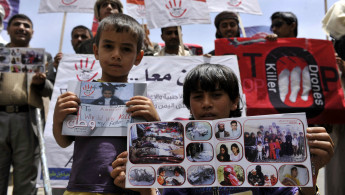Drone attack kills four Qaeda suspects in Yemen
The US has vowed no let-up in its unmanned aerial campaign against Qaeda targets despite Yemen's chaos.
2 min read
US drone strikes in Yemen are a deep and continuing source of anger (Anadolu)
A drone strike killed four suspected al-Qaeda militants in Yemen Saturday, tribal sources said, the second attack in a week since Washington vowed to pursue its campaign against the jihadists.
Tribal sources told Agence France Presse the unmanned aircraft, which only the United States operates in the region, targeted a car carrying four militants in the southern province of Shabwa, a stronghold of the jihadist network.
A similar strike on a car on Monday in a desert area between Shabwa and the neighbouring province of Marib killed three suspected members of al-Qaeda.
That vehicle was hit by four missiles.
The previous day US President Barack Obama had vowed no let-up in Washington's campaign against jihadists in Yemen.
He dismissed suggestions that deepening chaos in Yemen since the resignation of Western-backed President Abd Rabbuh Mansour Hadi last week had forced a change in Washington's campaign against al-Qaeda.
Obama ruled out US troop deployment in Yemen but said Washington would continue "to go after high value targets inside Yemen", admitting however that this was "a long, arduous process".
According to the New America Foundation, the United States has carried out more than 110 strikes on targets in Yemen since 2009, mostly using drones.
During that period, a total of somewhere between 800-1,100 people have been killed, according to the Washington DC-based think tank, which keeps a data base on the drone programme.
Of these at least 81 were civilians. Some 50 deaths remain unaccounted for.
One such attack in September 2011 killed US-Yemeni cleric Anwar al-Awlaqi, a leader of al-Qaeda in the Arabian Peninsula accused of instigating a string of attacks against the United States.
AQAP, which Washington considers the most dangerous branch of the global terror network, also claimed responsibility for the deadly 7 January attack on French satirical weekly Charlie Hebdo.
Tribal sources told Agence France Presse the unmanned aircraft, which only the United States operates in the region, targeted a car carrying four militants in the southern province of Shabwa, a stronghold of the jihadist network.
A similar strike on a car on Monday in a desert area between Shabwa and the neighbouring province of Marib killed three suspected members of al-Qaeda.
That vehicle was hit by four missiles.
The previous day US President Barack Obama had vowed no let-up in Washington's campaign against jihadists in Yemen.
He dismissed suggestions that deepening chaos in Yemen since the resignation of Western-backed President Abd Rabbuh Mansour Hadi last week had forced a change in Washington's campaign against al-Qaeda.
Obama ruled out US troop deployment in Yemen but said Washington would continue "to go after high value targets inside Yemen", admitting however that this was "a long, arduous process".
According to the New America Foundation, the United States has carried out more than 110 strikes on targets in Yemen since 2009, mostly using drones.
During that period, a total of somewhere between 800-1,100 people have been killed, according to the Washington DC-based think tank, which keeps a data base on the drone programme.
Of these at least 81 were civilians. Some 50 deaths remain unaccounted for.
One such attack in September 2011 killed US-Yemeni cleric Anwar al-Awlaqi, a leader of al-Qaeda in the Arabian Peninsula accused of instigating a string of attacks against the United States.
AQAP, which Washington considers the most dangerous branch of the global terror network, also claimed responsibility for the deadly 7 January attack on French satirical weekly Charlie Hebdo.





 Follow the Middle East's top stories in English at The New Arab on Google News
Follow the Middle East's top stories in English at The New Arab on Google News
![Israeli forces ordered bombed Gaza's Jabalia, ordering residents to leave [Getty]](/sites/default/files/styles/image_330x185/public/2176418030.jpeg?h=a5f2f23a&itok=_YGZaP1z)

